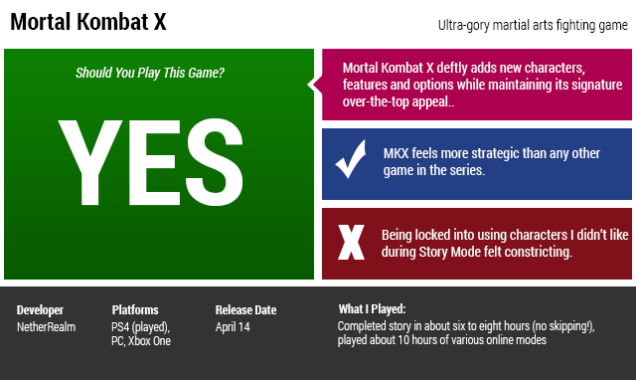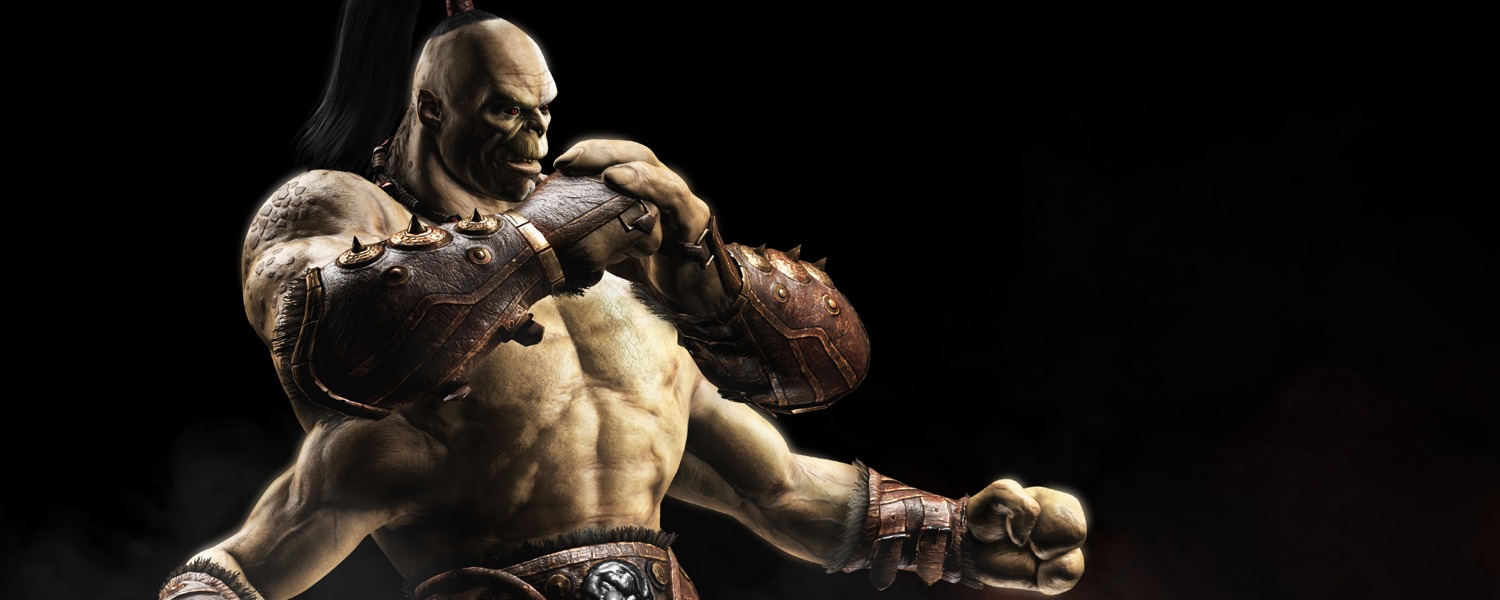
This is a next-generation Mortal Kombat in more ways than one. MKX is the first game to appear on Sony and Microsoft's newest home game machines (along with PC). The tenth Mortal Kombat game also features new characters, some of whom are the sons and daughters of classic Kombatants like Johnny Cage and Jax Briggs. You get the sense that Netherrealm is trying to infuse fresh blood into their franchise---in terms of both characters and design---while simultaneously courting acclaim from the world of hyper-competent pro-competition players.
Mostly, the ambition pays off.
The storytelling improvements are probably best represented by how much I actually cared about what would happen next while playing Story Mode. By centering its bombastic story on characters who've aged, been resurrected and are trying to prove themselves to older Kombatants, Mortal Kombat X feels like the most mature game in the series. Now, this is still a game where players regularly dismember each other and fracture each other's necks in five places. But I was impressed by how many of the story beats revolving around family and belonging hit home. Jax's retirement after being enslaved by necromancy or Cassie's yearning for maternal approval, for example, makes the bone-snapping and blood-letting count for just a little more than cheap thrills.
Mortal Kombat X succeeds largely by knowing what to take seriously and where to be self-aware. You can hear evidence of the latter in the characters' chatter, for example. This is the first fighting game in a long time where I haven't gotten sick of hearing characters jaw at each other after the first day. And evidence of the former? It's all in the impressively textured and lit stages, filled with interactive elements that make each faster, more strategic and more improvisatory than ever before.
Used to be that the spatial relationship to a player's opponent was fairly predictable in Mortal Kombat. You could expect jumps from a certain distance, desperate flailing to get out of corners (or to keep fools hemmed in) and ranged attacks from across the screen. When I played it over the years---starting with the Genesis version while I was in college---Mortal Kombat always felt mired in the dumb, meathead end of the fighting game continuum. Games like Virtua Fighter and Tekken felt more strategic to me---limited as my skills were/are---and less vulnerable to cheesy repetition.
MKX comes across as an attempt to mix things up. It takes the interactions that Netherrealm sprinkled in the environments of Injustice: Gods Among Us and multiplies them. Spots where you can vault out of a corner, swing on a low-hanging vine or yank an old lady out of the background and lob her at an opponent are in every level. These stage interactions add another layer of movement and attack options to the design formula, resulting in an experience that feels bouncy and lively.
The other bit of experimentation that MKX introduces is the concept of variations. These are options that let players choose from a character variant with different specialties. Some open up different special attacks while others let you lay traps for your opponent. All of them make you re-think strategy. So, while you may think you have a handle on how to keep Scorpion's Ninjutsu variation at bay, someone may come at you with an Inferno or Hellfire variation instead. Players can also play in various sorts of Towers---which offer obstacle courses of opponents that get randomized with different characters and variables. (The Klassic towers are still in here, too, offering a no-fuss gauntlet of matches.) Overall, things in this Mortal Kombat feel much more layered as a result.
Every bit of participation in MKX gives players in-game currency called koins, and special challenges will cough up even more. Perform a gruesome X-Ray attack and win the match? You get bonus koins for that. All of that blood money gets spent in the Krypt. The giant explorable adventure area is where players open up graves and other treasure-bearing elements to grab rewards like more koins, alternate outfits or new fatalities. Players also get prompted to join a faction in MKX, aligning them with one of five organizations from Mortal Kombat lore. Specific actions add to each faction's progress and individual players get varying koin payouts depending on how their team does. And each Faction will have specific finishing moves available to its members.
Another layer to MKX's gore-frosted cake comes from its many online options. Some of them come to life in the game's Living Towers. They get served up in hourly, daily and premier permutations, each rejiggering opponents and variables in divergent ways. One might throw you into a series of matches where bombs are constantly dropping from overhead, giving you random elements to defend against and making things more chaotic. Another might fold in hyperspeed, rapidly draining health or a no-throwing proviso. (The same kind of recombinating also happens in single-player and multiplayer Test Your Luck matches, too.)
The Lost Shokan tower, for example, let me play as Goro without having to shell out the required dough for the DLC character. I got to scratch that particular itch two days ago and don't really feel the need to pay for the four-armed monster. Mortal Kombat's come in for criticism for the way it's locked certain characters or features behind a paywall. Yes, it'd be cool to play as classic characters like Baraka. But there's so much to do in the baseline game that I never felt like I was being robbed of a chance to enjoy myself.
My first week with MKX online was initially rough. It took a long time to get matched up with opponents, and towers and rooms wouldn't load. Since the 1.02 update this past weekend, my experience has been vastly improved. I'm still having instances where faction data doesn't appear to be syncing and living towers won't load, but they seem to be more intermittent than persistent.
Actual matches work just fine with very little lag or slowdown thus far. King of the Hill multiplayer mode is amongst the most fun, gathering players into a round-robin mini-tourney where everyone battles for supremacy. It's a great way to stay competing online without having to back out and find new competitors.

MKX doubles down on the B-movie aesthetic that inspired the very first game in the series and the weird recipe of hyped-up kung-fu mysticism and high-tech military sci-fi that's become Mortal Kombat's signature flavor is in full bloom here. It's especially strong in the new Kombatants. I like some more of them more than others but have found at least one I'm going to put some time into practicing with. That's a small example of an important ingredient to fighting-game franchise longevity: characters, modes and improvements that entice both new and longtime players to commit to it.
Is Mortal Kombat X still a game that you can enjoy mindlessly, gleefully rupturing spleens as a result of random button-mashing? Yes. No lie: the first time I pulled off a Scorpion fatality, it was purely by accident. I hadn't looked at any guides yet and just tapped out the inputs that felt right. The fact that I was able to do it at all made me feel like NetherRealm's thought a lot about what "would feel right" for MKX. I haven't been able to stop playing it in the week that I've had the game, constantly checking what the living towers have on offer, practicing special moves and jumping into solo Test Your Luck matches. Mortal Kombat X is a damn good sign that the twenty-year relationship I've had with Sub-Zero, Kung Lao and the rest is going to continue for a long, long time.



